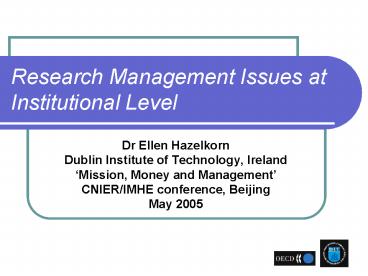Research Management Issues at Institutional Level - PowerPoint PPT Presentation
1 / 16
Title:
Research Management Issues at Institutional Level
Description:
Global knowledge society Strategic importance of national research strategy ... and decide whether it is appropriate for their own society or culture....China ... – PowerPoint PPT presentation
Number of Views:40
Avg rating:3.0/5.0
Title: Research Management Issues at Institutional Level
1
Research Management Issues at Institutional Level
- Dr Ellen Hazelkorn
- Dublin Institute of Technology, Ireland
- Mission, Money and Management
- CNIER/IMHE conference, Beijing
- May 2005
2
- Given that research practices are changing and
the pressures to deliver significant outputs are
intensifying, the key question is how to
structure and organise teaching and research in
the universities (Gibbons et al, 1994).
3
Theories Underlying Change
- Systems of Innovation (Lundvall, 1992 Nelson,
1993) - Mode 2 (Gibbons, et al, 1994 Nowotny et al,
2001) - Triple Helix (Etzkowitz and Leydesdorff, 1997)
- Entrepreneurial University (Clark, 1998 Clark,
2004)
4
HE Research as Economic Driver
- Global knowledge society ? Strategic importance
of national research strategy - Academic knowledge production ? Innovation ?
Economic growth - Task of growing research capability and capacity
no longer optional
5
Institutional Opportunities
- National and regional economy
- Institutional history and development
- Research experience, capability and capacity
- HE system and role of individual HEIs
6
Identifying Institutional Objectives
- Teaching-only
- Research informed
- Research based
- Research active
- Research led
- Research intensive
- Research-only
7
Strategic Choices
- Applied vs basic research?
- Teaching vs research?
- Individual vs research teams?
- Recruit or grow?
- Specialisation vs comprehensive research
activity? - Decentralised vs centralised management?
8
Basic vs Applied Research?
- Widening the definition of research
- Boyer 4 scholarships
- Gibbons Mode 2
- Creative and Professional Practice
9
Teaching vs Research?
- Academic contracts usually include requirements
to teach and conduct research - Research activity is a key criteria in
appointment and promotion - Dual career paths?
10
Individual vs Research Teams?
- Research is dependent upon individuals but is no
longer an individual activity - Shift locus of activity away from individuals and
towards clusters - Emphasis on critical mass of scholars based
around interdisciplinary teams with
grant-awarding reputations and timely outcomes
11
Recruit or Grow?
- Should an institution recruit new faculty or help
existing faculty develop new or enhanced skills? - ability to recruit good researchers,
- availability of competence,
- available funding,
- responsiveness of faculty.
12
Specialisation vs Comprehensive Research
Activity?
- Creating competitive advantage
- Priority setting activity
- Competitive funding opportunities
- Resource allocation models
- Identify research active faculty
- National or institutional priorities
13
Decentralised vs centralised management?
- Professional management
- Research office
- Institutional research committee
- Role of individual researchers?
14
Recommendations (1)
- Investment Strategy Align budgets to support
research, research active staff competitive
research. - Organisational Structures Establish research
Office and designated positions, including a
graduate school - Performance Indicators Use benchmarks to shape
priorities, funding, recruitment, etc. - Priority-setting Map competences and niche
specialisation against national/international
priorities.
15
Recommendations (2)
- Research Centres Grow research groups capable of
winning external funding and recognition. - Align Priorities with teaching, funding and
infrastructure. - Strategic Alliances Link with other HEIs and
public/private organisations to match priorities - Leadership Ensure Strategy is endorsed by
President, senior management and boards of
trustees
16
- The nature of higher education development is
not limited by national boundaries, but each
nation must have the capacity to examine the
costs and benefits of each new development and
decide whether it is appropriate for their own
society or culture.China and its international
partners have much to learn from one another.































